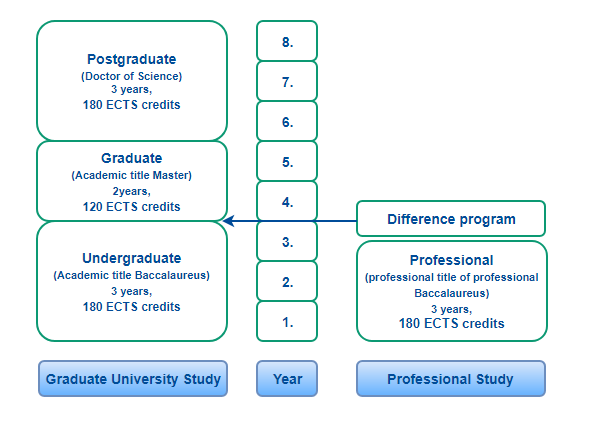The study programmes, established according to the Bologna Declaration, aim to enhance the quality of studying through adopting the European values and European cooperation in higher education. The Faculty offers undergraduate, graduate and postgraduate university studies, usually referred to as a model 3+2+3, i.e.:
The allocated duration of undergraduate study is three years, resulting in the academic title of Bachelor within a given area of specialization.
The second cycle of academic education refers to graduate study, which last typically three years. Students are awarded by the academic title of Master with an area of specialization. Upon completion of undergraduate and graduate university studies, the educated professional acquires competences to perform tasks of greatest complexity, but also fulfils the requirements for admission to postgraduate studies.
Finally, the third cycle of university education is the postgraduate study which lasts for three years, leading to the academic degree of Doctor of Science.
Vocational study programmes provide students with an adequate level of professional competences, enabling them to carry out technical tasks and providing the graduates with an opportunity for immediate employment.
Undergraduate vocational study programmes lasts for 3 years and 180 ECTS credits are earned. By earning additional ECTS credits via differential programme, students who have completed vocational studies may be admitted to corresponding graduate programmes.

Electrical Engineering and Information Technology ( detailed proposal of the study programme), specializations:
Control and Systems,
Electronics and Computer Engineering,
Electrical Engineering,
Communication and Information Technology,
Computing (detailed proposal of the study programme)
Mechanical Engineering (detailed proposal of the study programme)
Naval Architecture (detailed proposal of the study programme)
Industrial Engineering (detailed proposal of the study programme)
Undergraduate study is usually a basis for several graduate studies, in which students specialize in a particular area and the classes are taught in smaller groups. In addition to basic courses, a number of general courses are taught at the undergraduate level. Upon completion of undergraduate studies, students gain competence to perform simple tasks, required in the labour market, fulfilling requirements for admission to the next level of education or graduate studies, either at this Faculty or another one. At this point, the labour market has not yet recognized experts who have completed undergraduate studies, so basically, all students who complete undergraduate studies, continue their education.
Electrical Engineering and Information Technology (detailed proposal of the study programme), specializations:
Electrical Engineering,
Electronics
Computing (detailed proposal of the study programme),
Mechanical Engineering (detailed proposal of the study programme),
Naval Architecture (detailed proposal of the study programme)
Control and Systems (detailed proposal of the study programme) precondition for enrollment: completed undergraduate study in Electrical Engineering and Information Technology;
Electrical Engineering and Information Technology, precondition for enrollment: completed graduate study in the field of Electrical Engineering and Information Technology;